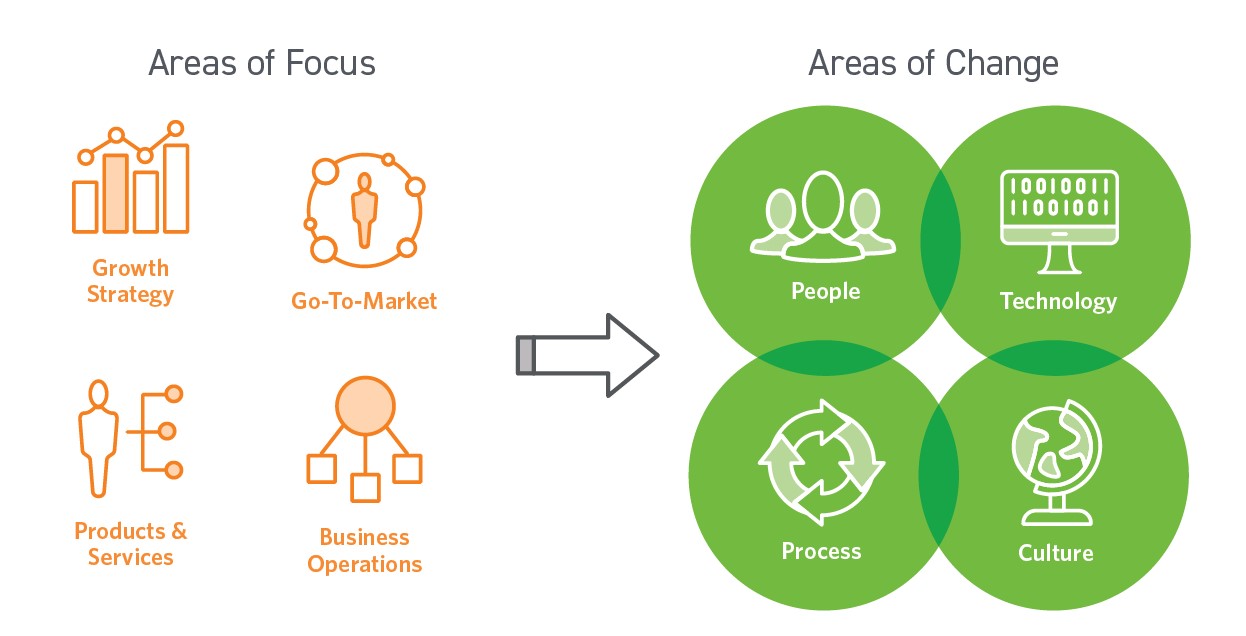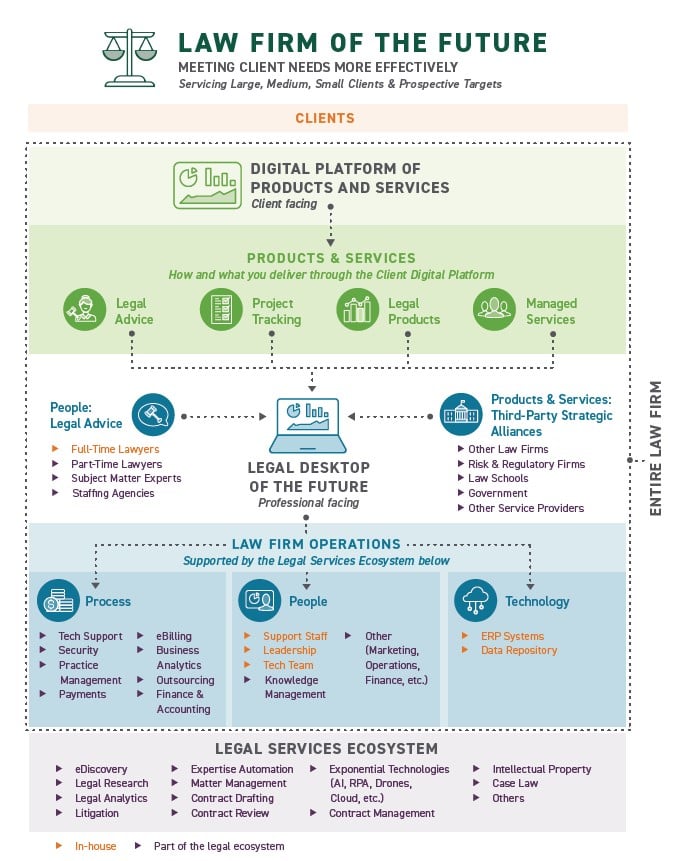Current State of the Legal Industry
Law firms, like most industries, have seen significant shifts over the past few years, including:
- increase in the need and complexity of legal advice;
- changing needs of buyers of legal services;
- role of General Counsel and Corporate Legal Departments (CLDs);
- mainstream use of Alternative Legal Services Providers (ALSPs) and Big Four accounting firms (Big Four); and
- competition for junior legal talent.
The role of the lawyer in today’s technology-enabled environment has become even more important. In addition to understanding the laws in their area of expertise and providing legal advice to clients, lawyers must now advise their clients on the challenges they could face pertaining to the legal, risk, and regulatory implications of various technologies. They are also expected to share changes in the business and political environment that could impact them, such as insights into legal, risk and regulatory issues related to data storage, privacy and security of data.
The Changing Role of the General Counsel
Another role that has seen significant change is that of the General Counsel. Previously the CLD was a support function and was brought in when the company was dealing with a legal challenge. Today the role of the General Counsel is that of a proactive strategic adviser to the C-suite in the areas of legal advice, crisis management, corporate conscience, and a business partner for growth. As technologies are implemented to increase revenues and improve efficiency and effectiveness, the General Counsel is now providing business insights and the legal risk and regulatory implications of implementing various technologies and ensuring the security and privacy of the organization.
Defining the Evolution of Corporate Legal Departments
With the everchanging landscape we are witnessing, CLDs are insourcing some of the lower value-add legal activities, or leveraging technologies and services being provided by ALSPs, Big Four, and other Service Providers. CLDs are in turn, pushing their providers, both for the business and the practice of law, to:
- be more technologically savvy,
- deliver a combination of legal, business, and technology capabilities,
- augment their expertise, and enable them to improve their efficiency and effectiveness, and
- better meet the needs of executive leadership.
Mainstream use of Alternative Legal Services Providers
The ALSPs, with the help of venture capital and private equity investors, have gained significant traction and scale, along with the Big Four, and compete with law firms for legal managed services and business of law activities, such as practice and matter management, contract drafting, review, generation, and managed services. Law firm revenues for low value and commoditized legal tasks are being negatively impacted as more revenue moves to ALSPs and the Big Four.
Competition for Talent
Many law firms are also facing extreme competition for talent, as junior professionals want more flexibility, the ability to work remotely, and perform more value-added meaningful tasks. As a result, law firms are paying higher salaries for junior talent.
Digitally Transforming the Business and Practice of Law
To address the complex and changing market environment for legal advice, the “law firm of the future” will need to operate differently; re-evaluating everything from how the firm is positioned in the marketplace, products and services offered, to business operations and harnessing the value of human capital. Below we examine the key areas of focus to stay competitive:

Expanded Go-To-Market Strategy
Law firms will need to expand their go-to-market approach and deliver services to clients by:
- going beyond personal relationships with senior lawyers,
- actively leveraging CRM systems,
- utilizing digital marketing,
- formalizing the business development function and leveraging sales professionals, and
- developing a digital platform to interact with clients, deliver services, and track progress on cases.
Development of Products and Services
Law firms have always focused on providing high-end, white glove customized legal advice to their clients, delivered by experienced lawyers with deep expertise in the nuances of the law. Firms possess significant business and industry information which could be utilized to create productized subscription type offerings.
These types of solutions can help corporations manage their legal issues more effectively, benchmark against competitors, and understand regulatory and legal implications of policy changes. Analytics, tools, and templates also can be used for low value-added activities, such as generating contracts, etc. and could potentially create a recurring revenue stream for law firms.
Evolving Business Operations
Law firm business operations need to evolve to meet the needs of General Counsel and in-house legal departments by leveraging alternate business and talent models. Change in operations will likely lead to a complex ecosystem of in-house professionals and technologies, augmented by legal technology and service providers. Operational change should focus on four key areas: People, Process, Technology, and Culture.
People
Lawyers are the core knowledge professionals for the business, with support staff in the areas of knowledge management and technology operations, supporting the lawyers and the business. In the “law firm of the future,” talent will need to be viewed differently. The following are ways in which firms can enhance culture and capability:
- Enable legal professionals to work on-site and remotely, which will require providing them with access to mobile desktops, files, and cases, from any location.
- Add a combination of full-time and part-time legal resources to address talent shortages.
- Consult or contract subject matter experts for cases requiring specialized knowledge.
- Leverage service providers for short-term legal talent to meet demand spurts.
- Create incentives to hire and retain junior talent looking for a more rewarding work experience.
- Increase the mix of non-legal professionals with knowledge in technology, analytics, etc., to support the growing needs of their lawyers.
- Utilize outsourced service providers for support activities.
Process
It will be important to understand key activities being performed by legal professionals, create journey maps for the ones that are the most time consuming, and determine ways to optimize processes using a combination of alternate business and talent models and technologies. Some examples of process improvement include:
- Optimize business delivery using a mix of in-house professionals and players from the legal services ecosystem.
- Leverage outsourced managed service providers for nonrevenue generating activities, such as finance, accounting, analytics, and for revenue generating activities in areas like marketing and business development.
- Utilize expert firms for technology management and support, security and privacy, risk, and regulatory issues.
Technology
Technology will be the critical enabler of change. Each aspect of the business will need to be tech-enabled. The role of the Chief Information Officer at the law firm will become even more critical as they:
- Create a seamless experience for the firm’s clients and professionals,
- Safeguard security and privacy of all data,
- Ensure that all legal, risk and regulatory issues related to the use of various technologies are addressed,
- Create and deliver an ecosystem of technology, information, and service providers to better meet the needs of the lawyers, and
- Provide leadership with analytics for better decision-making.
Culture
It will be critical for leadership to recognize the importance of change management within the firm and the impacts these changes will have on the culture of the firm. This is a journey — through training and leveraging a change management mind-set, it will allow professionals and staff to do things differently. If change is not managed effectively, operational and technology changes to transform to a “law firm of the future” could fall flat.

Professional Facing Desktop of Each Lawyer – Illustrative

The best way to deliver services to customers will likely require a portal on the desktop of each lawyer – a “Legal Desktop of the Future” – that enables lawyers to focus on the most value-added activities, while automating the more mundane and repetitive tasks, aligned with their client journey, and enabling them to deliver high quality services to their clients.
A Digital Platform for Products and Services
At the same time, a customizable client portal should be implemented to better deliver and track legal services and provide customized analytics, insights, and information to clients. Today’s consumers are accustomed to leveraging portals tailored to their needs, as seen by the success of platforms such as Amazon and Netflix. The key for law firms will be to use the portal to maintain the overall client relationship. Then, as needed, bring in other adjacent service providers likely needed by the client, such as risk, regulatory, and specialized service law firms to further service the client.
How to Achieve the Desired Future State
For law firms, doing “business as usual” is no longer an option. Continued success requires a different approach to the business. Many leading firms are already acting and re-evaluating their current processes and procedures. However, some law firms are still in the early stages of their change journey – and some may have yet to begin.
Since there is no “one-size-fits-all” solution, we recommend that a law firm take a more holistic approach to optimizing its business and operations by examining its people, process, technology, and culture. Often leadership presumes technology will be the solution to their issue(s). Technology is the enabler of change, suggesting a correlation between business transformation and technology to achieve long-term success. An approach to determining next steps is to conduct a “design-thinking” session focusing on understanding the market changes, examining the current business model, and then developing an approach to reengineer the business.
The legal services industry will continue to evolve over the next several years. General Counsel and corporate legal professionals will continue to provide increasingly personalized and expanded legal advice to their C-suite, and expect the same from their knowledge service providers, at reasonable costs. They are also going to get increasingly comfortable using technology for the business of law.
Most law firms have already invested in technologies to improve their efficiency and effectiveness. Given the rapid pace of change, there is a need to continue to provide superior legal advice, while delivering seamless customer service, running an agile process, and becoming a growth-oriented law firm, while enhancing the work experience of legal and non-legal talent.
Get Started Now
To take advantage of the growing demand for legal services, while dealing with the increasing complexity of requests from the General Counsel, and to meet the challenges related to junior legal talent shortages, law firms must develop tangible strategies and execute on them to position their business for growth. Being proactive will be critical for success. Your journey will be unique, and we are here at every turn to guide you forward.




